Home
ABOUT
BIOGRAPHY
WORK
CONTACT

Home
ABOUT
BIOGRAPHY
WORK
CONTACT
スマホでご覧の方は、
画面を横向きにするとより見やすくなります。
Read the passage and choose the best answer among the four choices for each question.
The history of cafés
Nowadays, you can go anywhere in Japan and find a café to have a cup of coffee at a reasonable price. You can study, work, or just relax and read a book. However, getting into a heated discussion about politics with other patrons never occurs. Yet, in the 17th century, cafés in Europe served as a place for people to do exactly that.
The name “café” is a French or Italian term, while in England they were called “coffeehouses”. During that time period, England was in the midst of the Puritan Revolution and other political instabilities, and the people had no choice but to take up an interest in politics. The most common place for political discussions at the time was the tavern, but since coffee was cheaper, many people gathered at coffeehouses, regardless of their status. These discussions also utilized freedom of speech to criticize those in power, but it is said that the authorities sent in spies because of the danger of becoming a breeding ground for conspiracies. Also, politicians made use of coffeehouses to talk about future policies, and so did journalists as a place to gather information. In addition, they were also used as a place for business meetings and stock trading. Based on these circumstances, the 18th-century poet Pope said, “Coffee makes a politician wise”.
Cafés in France, on the other hand, were similarly used by intellectuals for discussions, but they were a bit more fashionable and exclusive than coffeehouses. From the 18th century, tea became more popular than coffee in England, and the role of coffeehouses declined, but cafés were still used in France. Some of the customers were revolutionaries, and it is said that their discussions in the cafés sparked the French Revolution that began at the end of the 18th century. There is no changing history, but if cafés had never existed, the contents of textbooks would tell a completely different story.
Practice!
Q1. According to the passage, coffeehouses were used to do many things except
Q2. The authorities are said to have sent spies to coffeehouses because
Q3. Which one below would most likely have happened if there had been no cafés in France?
解答
Q1. 3
Q2. 1
Q3. 3
解説
Q1.
第2段落3,5,6文目で、それぞれpotical discussions, gathering information, business meetingを目的としてコーヒーハウスが使用されたことが言及されている。
Q2.
第2段落4文目で、当局によってスパイが送り込まれた理由として、”the danger of becoming a breeding ground for conspiracies”が挙げられている。陰謀の温床となる危険性を述べている1が正解。
Q3.
第3段落3文目に、” their discussions in the cafés sparked the French Revolution”とあり、彼らのカフェでの議論がフランス革命の火付け役となったことが説明されている。裏を返せば、フランスにカフェがなければフランス革命は起きていなかったかもしれないと捉えることができる。
解釈
第1段落








第2段落


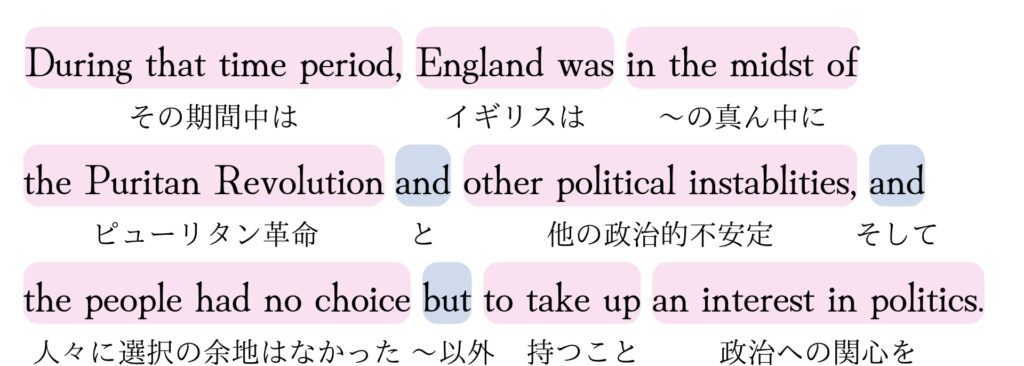

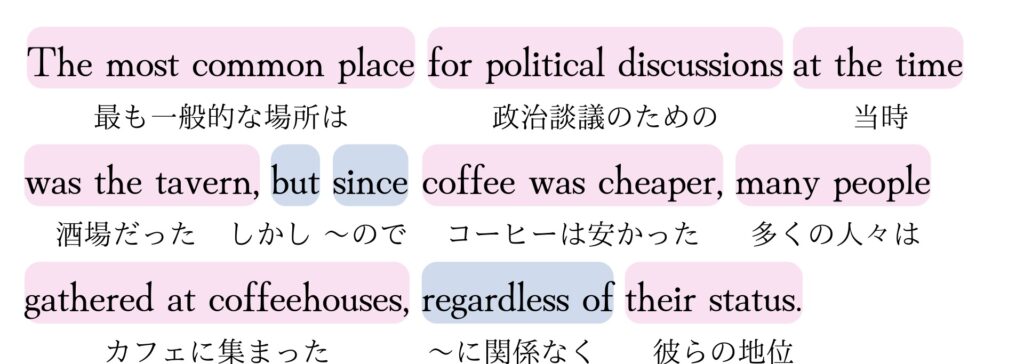

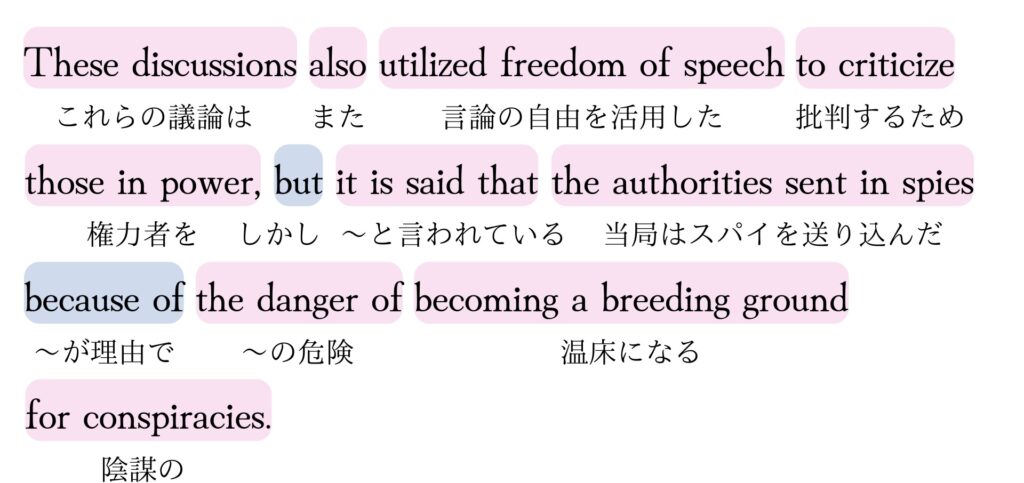
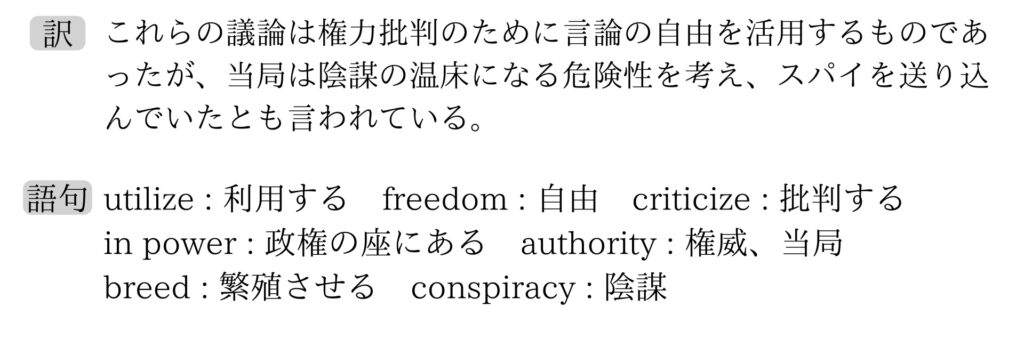
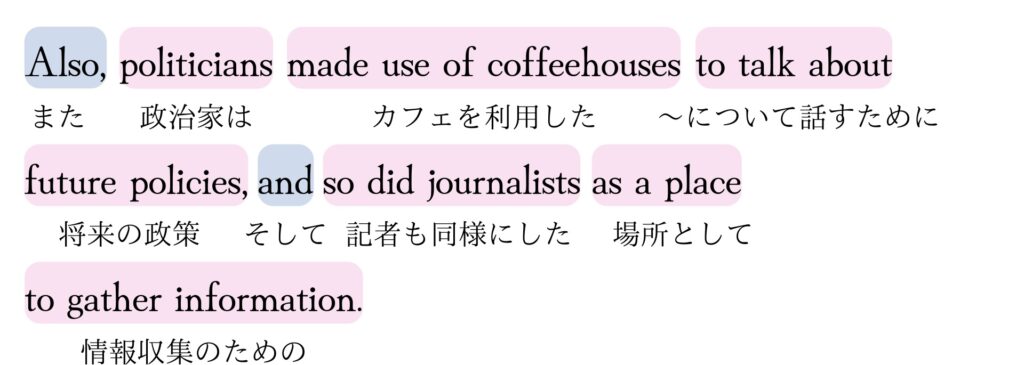





第3段落
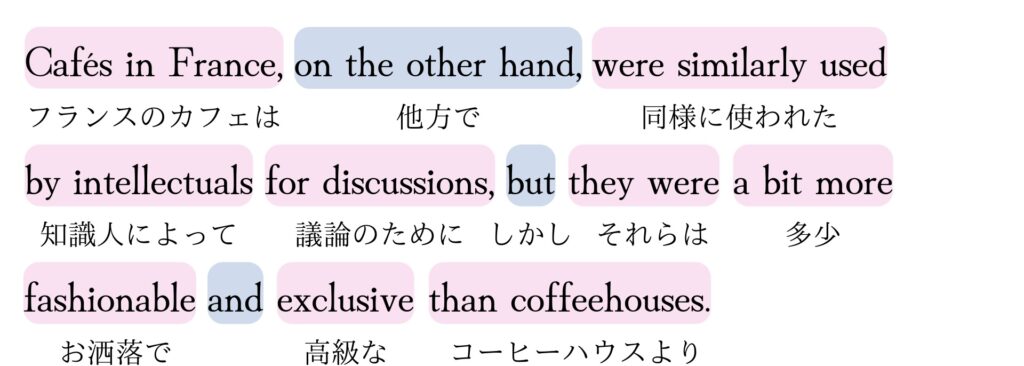

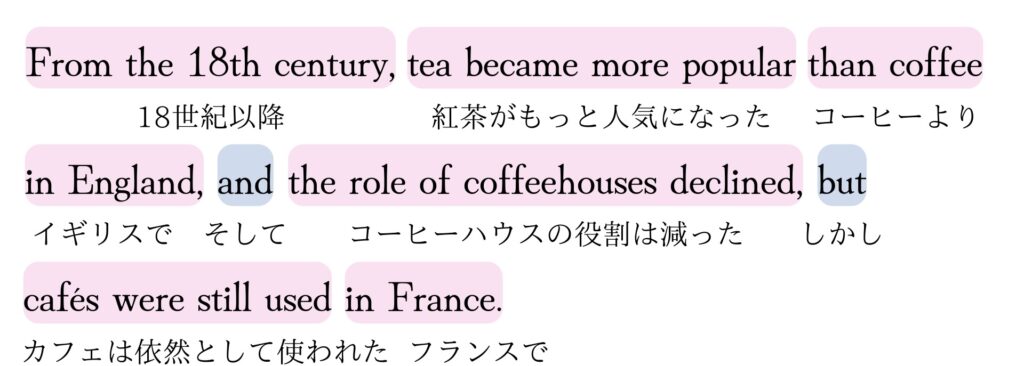

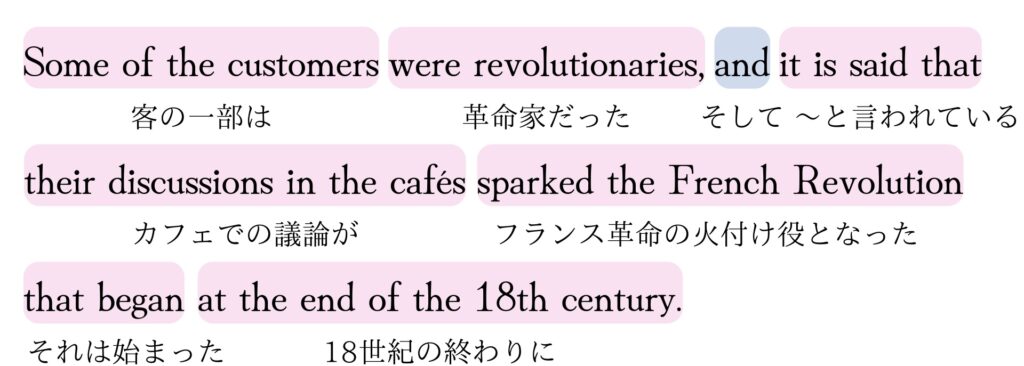



全訳
今や日本国内のどこへ行ってもカフェがあり、お手軽な価格でコーヒーを飲むことができる。勉強や仕事をしてもいいし、ゆっくり読書をするのもいい。しかし、他の客と政治について熱く語り合うようなことは決して起こらない。だが、17世紀のヨーロッパでは、カフェはまさにそのような場として機能していたのである。
“カフェ”という名前はフランスやイタリアでの呼び方で、イギリスでは“コーヒーハウス”と呼ばれていた。この時代のイギリスはピューリタン革命が起きるなど治世が不安定だったため、民衆は政治に関心を持たざるを得なかった。当時の政治談議の場といえば酒場だったが、コーヒーの方が安価であったため、コーヒーハウスには身分関係なく多くの人が集まり政治に関する議論を行った。これらの議論は権力批判のために言論の自由を活用するものであったが、当局は陰謀の温床になる危険性を考え、スパイを送り込んでいたとも言われている。政治家も利用しており、今後の政策について語ったり、ジャーナリストが情報収集の場として利用したりもした。また、商談や株取引もここで行われていた。これらの状況を踏まえて、18世紀の詩人ポープは“コーヒーは政治家を賢明にする”と述べた。
一方で、フランスにおけるカフェは、同様に知識人の議論の場として利用されていたが、コーヒーハウスよりも少しおしゃれで高級感がある場所だったようだ。18世紀からはイギリスではコーヒーよりも紅茶が人気になり、コーヒーハウスの役目は減ったが、フランスでは依然としてカフェが利用された。客の中には革命家もおり、18世紀末から始まるフランス革命もカフェにおける彼らの話し合いが火種となったと言われている。歴史を変えることはできないが、もしカフェが存在しなければ教科書の内容は大きく異なっていただろう。
[swpm_login_form]